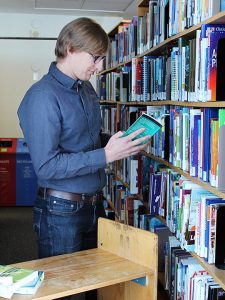
New Librarian, Old Books: Reflections on Collection Development
One of the great things about being the New Librarian in Residence is that I am encouraged to explore all aspects of librarianship. Even though my title is Digital Learning Librarian, part of my role at Humber College is that I liaise with the Humber Business School. In my liaison role, I teach information literacy classes for business students and I also collect business titles.
Recently, a large-scale weeding project has helped me gain experience with another facet of librarianship and brought me closer to Humber’s collection than I could have imagined.
 Collection Development
Collection Development
For a new librarian, collecting titles for the library felt like a huge responsibility and I knew I had a lot to learn. I had taken a course in collection development in my last year of library school, and at that time, the class projects felt distant and disconnected. However, the projects in that course turned out to be the perfect preparation for the experience I was to have here at Humber.
I felt prepared to analyze the collection from a variety of angles, and had confidence in my ability to look at the collection without standing amidst it. Additionally, one of the big projects at library school was to select titles for a library, title-by-title. During the assignment I lamented that all libraries use vendor pre-approval plans and that the title-by-title method was antiquated. However, after paying closer attention during the many job shadows and informational interviews I conducted that semester, I learned that title-by-title collecting is still practiced widely and can help to ensure the high quality of books selected to join the collection.
The Fates must have been laughing when I started my residency at Humber Libraries because collecting here is done on a title-by-title basis. Drawing from my library school project, I still make frequent use of book reviews, explore publisher’s websites, and poke around the small presses to see what they might be producing.
When I began selecting, I was relieved to have the guidance of my fellow business librarians: their keen eyes and judgment helped me review my initial choices. With their help, I narrowly avoided the purchase of some great sounding books that were actually juvenile non-fiction. I was embarrassed enough that I did not make the same mistake twice! Soon enough, I was on my own and absorbed in the process of title selection. I experienced a sense of deep satisfaction as I engaged in the time-honoured practice of collection development.
Weeding
To only speak about collecting is to leave out half the experience. The balance to all that ordering was weeding. This year the library staff and our entire collection will be moving into the Learning Resource Commons on the North campus of Humber College. In preparation for the move, we wanted to ensure that the collection was thoroughly weeded so that each book we move has a relevant purpose in the collection and is not moved unnecessarily.
First, I took a look at our circulation data to get an idea of the overall age of the business collection. I wanted to know where we were strong and where I could build. I wanted to see what books were the most popular and then try to understand why. Looking at the circulation data was fun but I could not help but feel that haunting disconnect I felt as a student in my collection development class. The exercise was academic, but lacking in the grounded feeling of being in the stacks.
The time had come for me to venture out into the stacks for my first official weeding session with a business librarian colleague. Together we pulled books from the shelves, inspected them for damage, publication date, and circulation frequency. We agreed on the withdrawal of some books and disagreed on others. Through that conservation I came to see the value of collegial debate and the nature of bibliophilia that undeniably remains a part my calling to the profession.
I have been back in the stacks on a regular basis to continue to weed the business collection, and each time I discover something new and interesting. The camera on my smartphone gets continual use as I photograph books so I can recall their information for ordering, or because the cover is beautiful, or hilariously outmoded. I am not sure if there is a way to get closer to a physical collection than by holding the books in your hands, turning the pages, and considering them as objects with unique histories. Through this process I have gone back to my orders and added new authors, updated series, and ordered fresh copies of books that have been too popular for their own good.
What this project taught me is that I can’t get to know the physical collection in just one way. Like a faceted stone, each perspective creates a new experience. Teaching students how to access the collection is one facet, another is examining the data generated though circulation statistics, and another is through physical contact with the books. I love the idea of approaching complex tasks like collection development and weeding through a faceted framework. It allows me to gain new perspectives and then put those perspectives into practice.
Caleb Domsy is a Digital Learning Librarian and the 2014 OCULA New Librarian in Residence at Humber College. He can be reached at caleb.domsy [at] humber.ca.
This Post Has One Comment
Comments are closed.



Caleb,
This is so wonderful! Glad to see you’re out there in the world making a difference and learning so much along the way. I found Collections Development, Evaluation and Management to be one of the most useful classes I took in the program as well, and I’m glad the final project was as rigorous and specific as it was (though we all complained at the time!). It really prepared us for the real work some of us would end up doing.
Congratulations on the position and on finding your niche!
-Andrea Zorzi